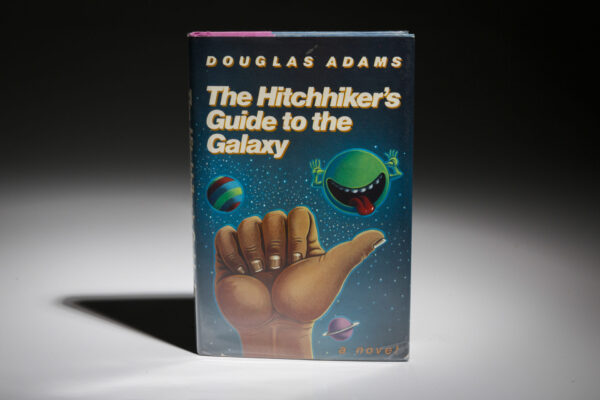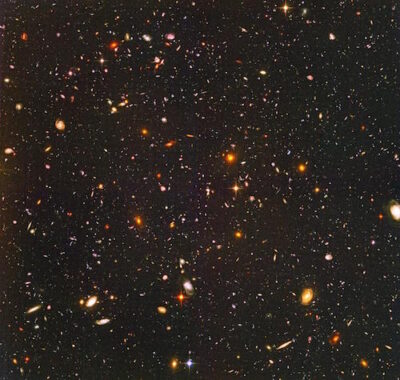
I finally read The Hitchhiker’s Guide to the Galaxy by Douglas Adams. I thank the Twitter accessibility community for ensuring that I did not miss this 1979 classic. Adrian Roselli’s Twitter profile got me curious: What is a “hoopy frood” I wondered, and why does its towel location deserve a spot in a Twitter 160 character-limited bio?
Adrian told me to read the book to find out.
My Hitchhiker curiosity was also piqued by Zoë Bijl’s response to my March 2022 tweet that included a picture of the empathy-inducing headset I had used during a presentation. Zoë replied that I should also consider the “point of view gun from Hitchhiker’s Guide to the Galaxy.” She even kindly sent a video clip explaining the weapon in response to my puzzled inquiry. [Thread here].
I found lots of ideas in the book that resonated with my twin passions of digital inclusion and Structured Negotiation — the subject of my book and a strategy for advancing digital accessibility without the conflict, stress, reputational damage, and financial cost of litigation (or fighting in general).
This week marks the 11th annual Global Accessibility Awareness Day (GAAD) Here are some ideas at the intersection of GAAD and the Hitchhiker’s Guide. Thank you to the late Douglas Adams for writing books in the 1970’s with relevance today. (There are actually 5 books in what Adams referred to as the Hitchhiker’s trilogy. I’ve read three and a half of them.)
Jump to:
- G is for Global … and the Galaxy!
- A is for Accessibility … an aspect of the Hitchhiker’s Guide
- A is for Awareness … on earth and in space
- Don’t make assumptions . . . even about 15 million seemingly dead people
- Aggression is no fun … even if you are a Vogon spaceship guard
- Value empathy . . .a point of view gun can help
- Be a good listener . . . even if you don’t have a babel fish in your ear
- Persistence is a value: resist the urge to throw in the towel.
- D is for Day . . . wherever it is in the time / space continuum
G is for Global … and the Galaxy!
 Accessibility is global in so many ways. The disability community is global. Disability organizations are global. Disabled people at the heart and core of digital inclusion are everywhere. Accessibility work is done by people around the world.
Accessibility is global in so many ways. The disability community is global. Disability organizations are global. Disabled people at the heart and core of digital inclusion are everywhere. Accessibility work is done by people around the world.
The companies that make the technology that must be accessibility are global. Laws preventing discrimination and requiring accessibility exist in countries (and states, cities, provinces, regional government bodies) around the world. The United Nations Convention on the rights of People with Disabilities, with strong digital accessibility language, has been ratified by over 175 countries across the globe.
And of course, this week we mark GLOBAL Accessibility Awareness Day.
The (massive) book from which Hitchhikers’ Guide to the Galaxy gets its title is beyond Global. After all, earth gets blown up on page 31, yet the adventures continue elsewhere through five books and a movie.
The image illustrating this section is from the NASA website. It was posted with the caption “This is the picture taken by the Hubble Space Telescope showing thousands of galaxies. Even the tiny dots are whole galaxies. The universe is a very big place!”
Do we need to start thinking about accessibility in the GALAXY? Forward thinkers already are.
The tagline for the non-profit Astro Access is “Advancing Disability Inclusion in Space.” Last year, the organization sent twelve disabled “ambassadors” on a ZERO-G Parabolic flight. The ambassadors conducted demonstrations to “understand how space vessels can be made more accessible by design and procedure.” Read the Astro Access October 2021 press release. Read the BBC News story about the flight.
I love being part of something global. I love accessibility conferences attracting champions around the globe. I love that my book will be published in Spanish this year thanks to advocates in Basque Country Spain. I love waking up to emails from friends and colleagues in far flung time zones. I love talks where my words are translated, and I love listening to the translated word of others.
I’m grateful for the global accessibility community every day.
Now that I’ve read Hitchhiker’s Guide I’m going to think more about a galactic community. I’m going to dream big, like Astro Access does, about accessibility in places that today may be at the heart of science fiction. But that tomorrow will be just a little bit closer to home.
Back to topA is for Accessibility … an aspect of the Hitchhiker’s Guide
 The Hitchhiker’s Guide to the Galaxy is a book about a gigantic book called The Hitchhiker’s Guide to the Galaxy. (Think Wikipedia two decades before it existed.) And it’s not just a paper back as is the image used for this post — it’s an accessible ebook book available in both digital and audio formats.
The Hitchhiker’s Guide to the Galaxy is a book about a gigantic book called The Hitchhiker’s Guide to the Galaxy. (Think Wikipedia two decades before it existed.) And it’s not just a paper back as is the image used for this post — it’s an accessible ebook book available in both digital and audio formats.
“It’s sort of an electronic book. It tells you everything you need to know about anything. That’s its job,” explained extraterrestrial Ford Prefect (from a small planet somewhere in the vicinity of Betelgeuse) to earthling Arthur Dent.
And when Arthur pressed a button, the words appeared on the screen and “at the same time, the book began to speak the entry as well is a still, quiet, measured voice.”
All Arthur could say was “What a strange book.”
Today an ebook that can talk is not strange. But too many books are still not accessible. On GAAD, let’s ask the publishing industry to commit that all books will be born accessible. Available in whatever format a person needs.
The Hitchhiker’s Guide to the Universe at the core of this book has been accessible since its creation in the mind of Douglas Adams more than 40 years ago. There is no excuse for inaccessible books in 2022.
Learn more about accessible books from the Accessible Book Consortium, the Daisy Consortium, and Bookshare. My book is available in accessible eBook format thanks to accessible publishing expert Laura Brady.
Back to topThinking about accessibility? Don’t Panic
So many people tell me they’d like to be more accessible, but they don’t know where to start. Or that tackling accessibility is just too hard. Too big. Too much to do. Or they are angry or scared after receiving a lawyer’s letter demanding money, a quick fix, or both.
Here the very cover of the Hitchhiker’s Guide can help. It reads simply:
Don’t Panic
Protagonist Arthur Dent first encounters the book shortly after his home planet earth has been blown up and he escapes to the galaxy with Ford Prefect. He recognizes the cover’s value:
I like the cover. It’s the first helpful or intelligible thing anybody’s said to me all day.Arthur Dent in the Hitchhiker’s Guide, page 47
The cover’s advice is helpful for those starting out in accessibility too. Don’t panic. Start where you are. Free accessibility resources are easy to find. (One great example is the free 24 hours of accessibility learnings this September during the ID24 conference.)
Tackle one accessibility barrier at a time and celebrate when you do. Plan and implement. Build a roadmap and stick to it. Find your allies and champions. Find the disability and accessibility community celebrating GAAD.
The Don ‘t Panic advice is particularly helpful if you are on the receiving end of a lawsuit or a demand letter. Panic may lead you to the wrong lawyer with bad advice. Or even worse, to the type of quick fix solution described in the Overlay Factsheet.
The Hitchhiker’s cover advice not to Panic is helpful wherever you are on your accessibility journey.
Back to topA is for Awareness … on earth and in space
GAAD has been phenomenally successful in raising AWARENESS about the need for digital accessibility. From a blog post written by Joe Devon in 2011, discovered by Jennison Asuncion that same year, GAAD celebrates its eleventh anniversary in 2022. Events are being held around the world (it’s GLOBAL!) and by organizations large and small.
To me, accessibility awareness also means an awareness of how we talk and write and think about accessibility. Do we always center people with disabilities? Do we remember digital inclusion is a civil right or do we think only of check-lists and legal risks?
Do we assume a lack of access is intentional (which it might be) or do we approach without judgment decision makers, tech owners, and others with the power to make change? What words do we use to convince people that accessibility is the ethical, legal, right course. That accessibility is good for business, essential to diversity, equity, inclusion and belonging, and a smart way to build positive brand identity and avoid reputational risk?
In practicing Structured Negotiation to advance accessibility for more than a quarter century, I’ve discovered strategies that making convincing easier. In my book and in talks and trainings I call these strategies dolphin strategies because you don’t have to be a shark to advance digital inclusion. I chose the dolphin metaphor because these sea creatures are good communicators and collaborators.
Turns out dolphins play a role in Hitchhiker’s Guide too.
 In Douglas Adams’ telling, dolphins are the second most intelligent species on earth (ahead of people, behind mice.) In the fourth book of the trilogy (not a typo) we learn that dolphins knew the earth would be destroyed. And that they tried to warn humankind. But humans didn’t listen.
In Douglas Adams’ telling, dolphins are the second most intelligent species on earth (ahead of people, behind mice.) In the fourth book of the trilogy (not a typo) we learn that dolphins knew the earth would be destroyed. And that they tried to warn humankind. But humans didn’t listen.
They didn’t listen because they didn’t understand dolphin language. Dolphins teleported away from earth before the big blow up but earthlings missed their farewell message too. It was simply, “So long and thanks for all the fish” There’s even a song about it!
Careful listening is an essential dolphin skill in any effort to advance accessibility. It’s been critical to win-win solutions in Structured Negotiation. And careful listening is not the only negotiation dolphin skill. Hitchhiker’s Guide offers its own examples of other dolphin strategies I describe in my book. Here are a few.
Don’t make assumptions . . . even about 15 million seemingly dead people
In book 2 of HHGG (The Restaurant at the End of the Universe, p. 186), hitchhiker Ford Prefect encounters what he thinks are 15 million dead bodies on a space ship. He wonders about them and asks the ship’s captain:
“I couldn’t help noticing the bodies..In the hold”
“Bodies” said the Captain in surprise?
Ford paused and thought to himself. “Never take anything for granted.. Could it be that the Captain doesn’t know he’s got fifteen million dead bodies on this ship?”
It turns out the bodies weren’t dead at all, merely frozen for a long (looong) flight to another planet. Ford’s assumption was wrong. The captain didn’t know.
Assumptions about accessibility can be wrong too. Don’t assume accessibility is too hard or too expensive. Or that there are no disabled people in your workforce, your customer base, or the general public that want to use your service. Most importantly, don’t make assumptions about what people with disabilities can do and want to do.
When talking about accessibility assumptions I frequently use the quotation: “Your Assumptions Are Your Windows On the World. Scrub Them Off Every Once In a While, Or the Light Won’t Come In.” [attributed to both Isaac Asimov and Alan Alda]. Now I’ll think of Ford Prefect too.
Aggression is no fun … even if you are a Vogon spaceship guard
Ford Prefect and Arthur Dent are in a pickle. Trapped on a spaceship run by evil Vogons, they are being marched to certain death by a spaceship guard ordered to throw them out of the ship.
The guard keeps reiterating the slogan of his profession: “Resistance is Useless.” But is it?
Ford Prefect tries a new tact: “Do you really enjoy this kind of thing,” he asks the guard? Does it give you a full satisfying life? Stomping around, shouting, pushing people out of spaceships…”
All the guard can say is “Well, the hours are good.” But now that you come to mention it, most of the actual minutes are pretty lousy.”
Prefect’s question should be asked to all lawyers on all sides of the table who think the only option when it comes to accessibility advocacy is aggression and fighting. Does sticking with the traditional litigation system give you a full satisfying life? Stomping around, shouting, finding loopholes?
Collaboration delivers long lasting results in accessibility in part because it builds relationships. Stomping and yelling doesn’t. And it provides advocates a way of being that is less stressful. Stomping and yelling doesn’t do that either, even for a Vogon spaceship guard.
Value empathy . . .a point of view gun can help
Ford Prefect practiced empathy when dealing with the Vogon guards. Arthur Dent couldn’t figure out why the hell his friend was getting all touchy-feely with the guard about to deliver them to their death. Ford explained it:
Try to understand his problem. Here he is, poor lad, his entire life’s work is stamping around throwing people off spaceships…and shouting…and he doesn’t even know why he’s doing it.Hitchhiker’s Guide, page 63
The Hitchhiker’s Guide movie has a neat method of conveying empathy. It’s called the Point of View gun. As the voice over explains:
If you point it at someone and pull the trigger, they instantly see things from your point of view Hitchhikers Guide to the Galaxy movie clip
As accessibility advocates we need a point of view gun. We need content creators, site developers, app builders, and others to understand that their decisions have the power to include people with disabilities or exclude them. We need procurement officers to understand how disabled employees are impacted when inaccessible tech is allowed into the workforce. Or how accessibility is essential to privacy of disabled people.
We don’t (yet) have a point of view gun. We have to use our communication skills and our advocacy strategies. We have to be a dolphin, not a shark.
Be a good listener . . . even if you don’t have a babel fish in your ear
 When Arthur Dent first finds himself face to face with beings from other planets, he can’t understand a word they are saying. Not a problem, his friend Ford Prefect said, just put this fish in your ear!
When Arthur Dent first finds himself face to face with beings from other planets, he can’t understand a word they are saying. Not a problem, his friend Ford Prefect said, just put this fish in your ear!
A babel fish in your ear automatically translates any language into the language of the person with the fish in its ear. It’s a wonderful technology for understanding. Alas, not yet available on earth, although app-based translation services are coming close.
I like thinking about the babel fish. It’s a good reminder that when advocating for accessibility, within our organizations or externally, we must learn the lingo of the organization and use words they understand.
Even when we speak the same language.
Persistence is a value: resist the urge to throw in the towel.
In my book I write about the value of persistence in advancing digital accessibility. And in my talks I often use the words of the former tv personality B. Smith, who said “I have stood on a mountain of no’s to find a single yes.”
We need to keep trying to convince leaders, get more money, explain accessibility’s value. We must stay optimistic and we cannot give up.
 To illustrate this point I sometimes think I should bring a towel to my talks, so people can visualize when I say, as I often do — “don’t throw in the towel, stay with it.” When looking back on 27 years of digital accessibility advocacy I see so many times in the middle of a Structured Negotiation when I could have thrown in the towel. I’m glad I held on to it.
To illustrate this point I sometimes think I should bring a towel to my talks, so people can visualize when I say, as I often do — “don’t throw in the towel, stay with it.” When looking back on 27 years of digital accessibility advocacy I see so many times in the middle of a Structured Negotiation when I could have thrown in the towel. I’m glad I held on to it.
A towel plays an outsized role in Hitchhiker’s Guide to the Galaxy. According to book within the book, it is the most “massively useful useful thing an interstellar hitchhiker can carry.” Learn more about why towels matter in the galaxy.
Not throwing in the towel is also massively useful for accessibility advocates. Think of it as your resolve to push forward, your commitment to stay on the journey. And like Ford Prefect (who was also a “hoopy frood,” ie. an amazingly together guy) always know where it is.
Back to topD is for Day . . . wherever it is in the time / space continuum
Here on earth we measure time in hours, days, months, years that flow in a line one from another. But Adams’ hitchhikers can and do experience milennia in a single day. So when we celebrate GAAD, is it on May 19 2022, or on a long ago or far in the future day? Do we really know?
I want to hold on to the possibility of galactic time and space. AND I want to live fully each day we have here on earth. For this I frequently turn to the quote by Mahatma Ghandi:
The future depends on what you do today.
This is especially true with accessibility. If we want an accessible tomorrow, we have to design and build and maintain it today. Let GAAD be the day we start doing more to ensure an accessible inclusive future.